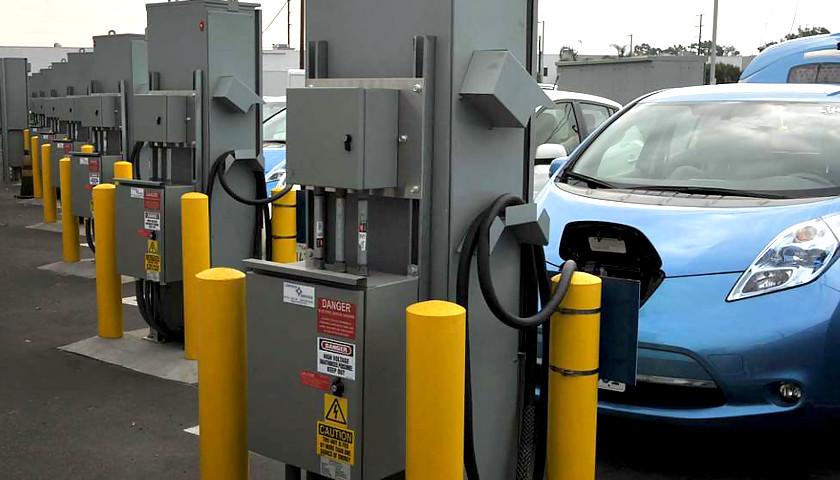by Nicholas Ballasy
New Internal Revenue Service (IRS) guidelines for the federal electric vehicle (EV) tax credit are a “recipe for fraud,” warns the head of the Tax Foundation.
Consumers will now be able to automatically claim the tax credit at the point of sale on new or used EV purchases, rather than wait to claim it on their tax return, according to the latest Treasury Department guidance.
“Under the Inflation Reduction Act, consumers can choose to transfer their new clean vehicle credit of up to $7,500 and their previously owned clean vehicle credit of up to $4,000 to a car dealer starting January 1, 2024. This will effectively lower the vehicle’s purchase price by providing consumers with an upfront down payment on their clean vehicle at the point of sale, rather than having to wait to claim their credit on their tax return the next year,” the new guidance states. “Only vehicles purchased under the consumer clean vehicle credits are eligible for this benefit.”
Eligibility for the tax credit is based on individual or joint income, creating a situation where the IRS would have to claw back the credit if an ineligible recipient received the credit at the point of sale on a new or used EV.
“This policy is a recipe for fraud, confusion, overpayments, and mistakes. And it will be very difficult for the IRS to police it and verify each transaction,” Scott Hodge, president of the Tax Foundation, told Just the News.
“Remember, buyers are only eligible for the credit if they earn less than $150,000 for singles and $300,000 for joint filers. Is it realistic to think that the salesman at a dealer is going to ask people to show their tax returns before purchasing the car?” Scott asked.
Scott pointed out that “eligible vehicles are capped below $55,000 for cars and $80,000 for trucks and SUVs” so the “point of sale credit is an invitation to fudge the purchase price.”
“Leased vehicles are also eligible for the credit, so that will be another avenue for fraud or simple errors. Most tax credit programs, such as the Earned Income Tax Credit and Child Tax Credit, have been very prone to errors, overpayments, and fraud,” he said. “I see no reason that the $7,500 EV credit will be any different. I predict a blizzard of investigations and exposes about fraud and errors in this program in the years to come.”
Democrats extended the EV tax credit with new rules under their $740 billion Inflation Reduction Act that passed last December. The legislation passed through budget reconciliation, meaning it only needed Democrat votes to pass. No Republicans in Congress voted for it, arguing that it was mostly a climate change focused bill that wouldn’t curb inflation.
Prior to passage of that bill, fraud problems plagued the previous EV credit, which was available up to $7,500 depending on the EV model. President Obama had signed that tax credit into law back in 2008 and it remained in place until the Inflation Reduction Act changed the rules for which type of EV models would qualify.
Under that legislation, EVs qualify if they are assembled in North America and meet certain “critical minerals” and “battery components” requirements.
In October 2019, a Treasury Department Inspector General report found that $73.8 million in tax credit funds were issued incorrectly for plug-in hybrid vehicles.
“The issue is that the IRS hasn’t verified VINs, and, in many cases, the automakers tally up the credits themselves without reporting individual VINs. Among tax returns filed by individuals, a total of 1509 people wrongly took $8 million from the federal government by double-claiming the credit,” according to this report, according to a Car and Driver report about the IG’s findings.
– – –
Just the News’ Nicholas Ballasy has been breaking news for more than a decade in the nation’s capital and questioning political leaders about the most pressing issues facing the nation. Since 2008, Ballasy has interviewed former President Bill Clinton, House Speaker Nancy Pelosi, former President Donald Trump, Sen. Mitt Romney, Sen. Bernie Sanders, Sen. John McCain, former Secretary of State Hillary Clinton, former Vice President Al Gore, former House Speaker Newt Gingrich and more.





